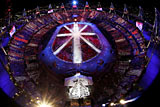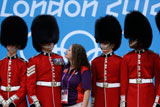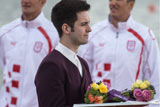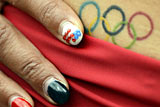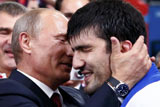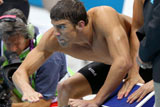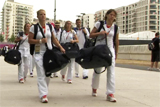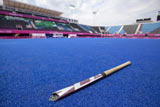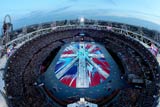Football
Updated: 2012-05-14 16:49:24
(london2012.com)
|
|||||||||||
The Football competition kicks off the London 2012 Olympic Games. Spread across six major grounds around thje UK, it offers all the drama that fans of the game have come to expect from major international tournaments.
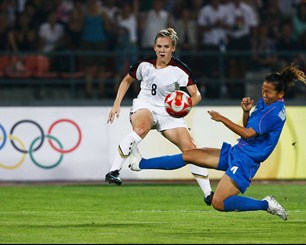
Competition dates
July 25 – Aug 11
Competition venues
City of Coventry Stadium, Coventry
Hampden Park, Glasgow
Millennium Stadium, Cardiff
Old Trafford, Manchester
St James' Park, Newcastle Upon Tyne
Wembley Stadium
Number of medal events
One men's and one women's competition.
Number of competitors
288 men and 216 women. Sixteen men's and 12 women's teams, with 18 athletes (11 players and seven substitutes) on each team.
Each country is limited to one men's and one women's team.
Field of play
The football pitches are not exactly the same size in all the venues, but vary between 100m–110m long and 64m–75m wide. The penalty spot at either end is 11m from the goal.
History of Football at the Olympic Games
Football was introduced as a medal sport at the Paris 1900 Olympic Games. Great Britain won the men's gold medal, then successfully defended their title four years later in Stockholm. The sport has featured at every Olympic Games since, except for Los Angeles 1932. The first women's competition was at Atlanta 1996.
The basics
The aim of football, to score more goals than the opposition, is simple and widely known. Teams of 11 players compete across two 45-minute halves, with extra time and penalty shootouts used to decide drawn matches during the knockout stages of the competition.
At London 2012 the men's Football is an under-23s competition, although each team is allowed to include three older players. There is no age restriction in the women's competition.
Competition format
At London 2012, both the men's and women's Football competitions begin with a preliminary stage: the 16 men's and 12 women's teams are divided into groups of four teams (four groups in the men's and three groups in the women's competition), and each team plays every other in their group. Teams receive three points for a win, one point for a draw and nothing for a loss.
The best eight teams in both the men's and the women's competition qualify for the quarter-finals. In the men's competition these are the top two teams from each of the four groups. In the women's competition the top two teams from each of the three groups go through to the knockout stage, along with the two best third-placed teams.
In the knockout matches the winners of the semi-finals go head-to-head in the gold medal match and the losing semi-finalists play for the bronze medal.
In the knockout stages only, ties are resolved by two 15-minute periods of extra time, followed if necessary by a penalty shootout of five shots per team. If the scores are still tied, the match will be decided by sudden-death penalties.
Officials
A referee on the pitch officiates each match with the help of two assistant referees, who are on either side of the pitch.
Keys to success
Football is a fast and physically demanding game. Players need to have speed, strength and stamina, as well as excellent ball skills and the ability to play tactically as a team.
Out of the medals
The referee will be looking out for rule infringements. Fouls may result in a yellow card, with a second yellow card resulting in a red card and instant dismissal. Players receive straight red cards for serious fouls, leaving the other team with an extra-player advantage. When a team commits an infringement, the opposition team is awarded a free kick. If a player is fouled inside the penalty area, his/her team is awarded a penalty kick.
Jargon buster
Advantage – played by the referee after a foul if he/she feels that the team which has been fouled would benefit from a continuation in play.
Extra time – if a match in the knockout stages is tied at the end of 90 minutes, the teams play 30 minutes of extra time in a bid to find the winner.
Foul – illegal interference with an opposing player, such as tripping.
Indirect free kick – a type of free kick from which the attacking team cannot score directly without more than one player touching the ball first.
Penalty shootout – if the scores are tied at the end of extra time, there's a penalty shootout in which each team has five penalty kicks. If the teams remain tied after five penalties, the shootout moves into a sudden-death format, meaning rounds of one kick per team to determine the winner.
Medal Count |
||||
| 1 | 46 | 29 | 29 | |
| 2 | 38 | 27 | 22 | |
| 3 | 29 | 17 | 19 | |
| 4 | 24 | 25 | 33 | |
| 5 | 13 | 8 | 7 | |
| 6 | 11 | 19 | 14 | |

